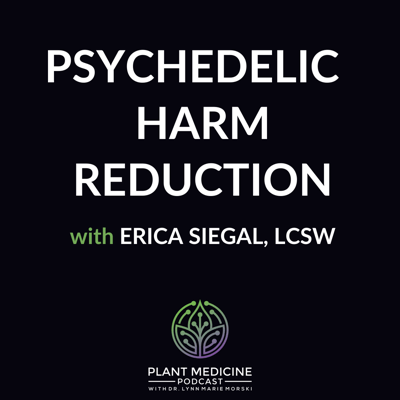Psychedelic Harm Reduction with Erica Siegal, LCSW
- 53
- 01/01/2021

Summary
This episode of the Plant Medicine Podcast features a conversation with Erica Siegal about the intricacies of harm reduction. Erica is a licensed clinical social worker and a professional harm reductionist, as well as an MDMA-assisted psychotherapy researcher. She is the founder of NEST Harm Reduction, a California-based clinical practice that offers private therapy, harm reduction training, workplace consulting, and direct care of workers on the frontlines of secondary trauma.
In this discussion, Erica shares the basic principles underlying harm reduction while also unpacking the nuances involved in providing care. The four principles Erica shares from the Zendo project are: 1) creating a safe space, 2) sitting, not guiding, 3) talking through rather than talking down, and 4) remembering difficult is not the same as bad. These principles provide a basic framework for providing harm reduction services for someone who has chosen to experiment with psychoactive substances.
Erica also discussed the acronym SPACE, which stands for sustainable, patient, authentic, consensual, and empathetic, with each of these terms playing a crucial role in effective harm reduction work. Sustainable refers to the emotional and energetic toll this work can take, and ensuring one isn’t spread too thin and heading towards burnout. Patience is necessary when engaging with someone who is going through a challenging experience, especially when their needs are shifting or they are having difficulties communicating.
Erica describes authenticity in the harm reduction context as staying grounded in one’s training and expertise and not trying to improvise modalities while sitting. Consent is also crucial when providing care, and Erica explains how to approach this topic both in the context of a pre-planned psychedelic experience and when the opportunity for harm reduction arises more spontaneously. Finally the harm reductionist should strive to be empathetic, providing proactive support through open communication and attempting to meet needs as they arise.
In this discussion, Erica shares the basic principles underlying harm reduction while also unpacking the nuances involved in providing care. The four principles Erica shares from the Zendo project are: 1) creating a safe space, 2) sitting, not guiding, 3) talking through rather than talking down, and 4) remembering difficult is not the same as bad. These principles provide a basic framework for providing harm reduction services for someone who has chosen to experiment with psychoactive substances.
Erica also discussed the acronym SPACE, which stands for sustainable, patient, authentic, consensual, and empathetic, with each of these terms playing a crucial role in effective harm reduction work. Sustainable refers to the emotional and energetic toll this work can take, and ensuring one isn’t spread too thin and heading towards burnout. Patience is necessary when engaging with someone who is going through a challenging experience, especially when their needs are shifting or they are having difficulties communicating.
Erica describes authenticity in the harm reduction context as staying grounded in one’s training and expertise and not trying to improvise modalities while sitting. Consent is also crucial when providing care, and Erica explains how to approach this topic both in the context of a pre-planned psychedelic experience and when the opportunity for harm reduction arises more spontaneously. Finally the harm reductionist should strive to be empathetic, providing proactive support through open communication and attempting to meet needs as they arise.
In This Episode
• The four guiding principles of psychedelic harm reduction
• Why romantic partners often don’t make the best trip sitters
• The intricacies of consent in a harm reduction setting
• Dealing with burnout as a harm reduction professional
• How to hold space in an authentic, empathetic way
• Gamifying harm reduction
Quotes
“Harm reduction is a movement for people who believe in human rights and dignity for anybody, including people who are actively using drugs.” [5:31]
“When we go into an altered state or use psychedelics, we are obviously shifting our perspective and therefore we need to make sure we have some safe things that can ground us back into our bodies and our experiences.”
[11:57] “If you are burning out and you are becoming someone who needs help, you’re not actually holding the space to do the work.” [19:32]
“I think all psychedelic practitioners, whether you are above ground or underground, should provide informed consent to clients.” [30:23]
“The only things that we do with somebody who is that significantly altered is be patient with them, and wait for them to be able to make decisions for themselves.” [36:29]
“Make sure you’re checking in about peoples’ basic needs because they forget. And that could be the thing that shifts it onto the right direction for them.” [49:54]
“When we go into an altered state or use psychedelics, we are obviously shifting our perspective and therefore we need to make sure we have some safe things that can ground us back into our bodies and our experiences.”
[11:57] “If you are burning out and you are becoming someone who needs help, you’re not actually holding the space to do the work.” [19:32]
“I think all psychedelic practitioners, whether you are above ground or underground, should provide informed consent to clients.” [30:23]
“The only things that we do with somebody who is that significantly altered is be patient with them, and wait for them to be able to make decisions for themselves.” [36:29]
“Make sure you’re checking in about peoples’ basic needs because they forget. And that could be the thing that shifts it onto the right direction for them.” [49:54]
Links
* The Psychedelic Medicine Podcast has allowed the Psychedelic Medicine Association to post episodes as an educational resource, and in return the PMA is hosting the podcast show notes.


